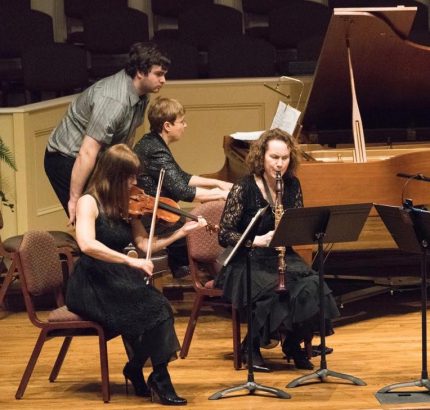Orion Ensemble explores their roots in diverse program
It’s not often one gets to hear an operatic paraphrase, movie music, and a Jewish wedding dance all in one night let alone on the same program. But this was the case Wednesday evening when the founding members of the Orion Ensemble took the stage at PianoForte Studios in the South Loop.
Their program, titled “Serenade by Three: Orion Beginnings,” traces the group’s history, and marked the ensemble’s 24th year. Wednesday’s performance by the three remaining founding members–clarinetist Kathryne Pirtle, violinist Florentina Ramniceanu and pianist Diana Schmück–was a vivid display of their varied repertoire, but not without a few bumps along the way.
The first item on the program, Bartok Dances for clarinet and piano, is a set of six miniatures by Edward Yadzinski. The music was adopted from Bartok’s Romanian Dances and seeks—as the program notes say—to showcase the “sassy persona” of the clarinet. There was sass at times, but the brevity of the six folk tunes often left the movements feeling interchangeable. Most memorable was the “Stamping Dance” in which Pirtle’s burnished clarinet tone floated over Schmück’s lugubrious accompaniment with ease, like fog shifting over a dark prairie. In “Children’s Dance,” Pirtle’s coquettish interjections were completely idiomatic with the coloring of the music.
Khachaturian’s Trio for clarinet, violin, and piano is a work of an entirely different character—more lyrical and pensive. Penned in 1932 during the composer’s residence at Moscow Conservatory, the work sounds like fragments of Late Romanticism. In the first movement, Ramniceanu’s poetic violin passagework wanders until Pirtle’s tactful counterpoint takes over. The second movement is a quick shuffle, which was sensibly executed by the trio. During the third movement, however, the mechanistic drive of Khachaturian’s music often crept into the group’s playing and rendered the phrasing more angular.
Liszt’s Rigoletto Fantasy is an ambitious choice for any pianist. The composer’s operatic fantasies are among his most virtuosic writing for the instrument, so much so that we seldom hear them played at all. The transcription sets the quartet from the final act of Verdi’s Rigoletto, leaving all the voices intact. Schmück’s interpretation was on the cautious side, and on occasion one wanted to hear more adventurous playing. There were also moments when the score got the better of her; with scales of double-thirds slowed down to accommodate her measured tempo. Still, performing such demanding Lisztian fare is no small feat, and Schmück’s smooth articulation of the many voices, mirrored unforgivably onto the piano by Liszt, made for an enjoyable experience.
Of the two items by Isaac Albéniz, Cordoba was the most striking and offered Schmück’s finest playing of the evening. A mystical interlude starts the work which later segues into dotted dance-like rhythms. Schmück brought colorful artistry to the work’s many shifts in character, using the pedal to spin an enchanting atmosphere. The work ended with a dolce coda, and left the listener with an impression of hushed reminiscence.
Ramniceanu dedicated her performance of Three Pieces from Schindler’s List to members of her family. The first piece is the famous violin melody, written by John Williams for Itzhak Perlman, to which Ramniceanu brought heartfelt sensitivity. While the scoring for Williams’ Three Pieces is not elaborate—a schmaltzy violin melody is set upon a modest piano accompaniment— but Ramniceanu’s unbridled compassion and commitment were impressive.
The Klezmer’s Wedding, by Srul Irving Glick, was the last item on the program, and proved an exhilarating closer with the best ensemble playing of the night. Glick’s Jewish-inspired textures, were evident among the many variations and during the finale, the group’s zany solos were flamboyant without being intrusive. The work ended with an energetic, tipsy two-step that had patrons tapping their toes to the infectious rhythm.
The Orion Ensemble will be joined by violist Stephen Boe March 12, 15, and 16. The program includes works by Gustav Mahler, Rebecca Clarke, and Robert Kritz. orionensemble.org
Posted in Performances






Posted Nov 18, 2016 at 4:05 pm by Sebastian Baptiste Huydts
I was glad to see this performance, which I attended and enjoyed very much, receive a positive, if not always insightful review. I question the necessity of a remark “but not without a few bumps along the way”, specifically because there is no follow up to substantiate. Does the reviewer mean to indicate that this was a live performance vs. a pre-recorded and heavily edited CD? Did he have restless patrons sitting next to him? Is it a requisite remark?
Arguably a matter of taste, but Ms. Schmuck’s rendition of the Liszt was one that drew me in from beginning to end, and convinced me that this is actually a good piece of music; perhaps tempo had something to do with it—Liszt is often played regrettably fast for virtuosity’s sake—but first and foremost her excellent shading, balancing of the multiple layers, the warm vibrant harmony and the singing line she drew out of the instrument made a case both for the composer and the artistry of the interpreter.